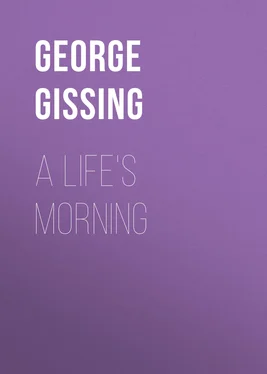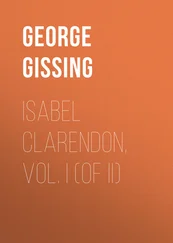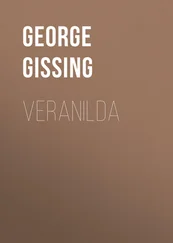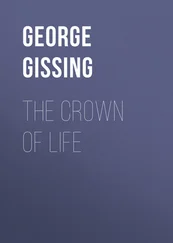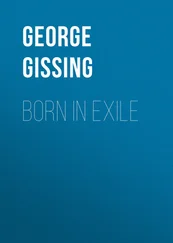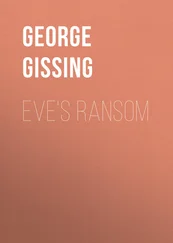George Gissing - A Life's Morning
Здесь есть возможность читать онлайн «George Gissing - A Life's Morning» — ознакомительный отрывок электронной книги совершенно бесплатно, а после прочтения отрывка купить полную версию. В некоторых случаях можно слушать аудио, скачать через торрент в формате fb2 и присутствует краткое содержание. Издательство: Иностранный паблик, Жанр: foreign_prose, literature_19, foreign_antique, на английском языке. Описание произведения, (предисловие) а так же отзывы посетителей доступны на портале библиотеки ЛибКат.
- Название:A Life's Morning
- Автор:
- Издательство:Иностранный паблик
- Жанр:
- Год:неизвестен
- ISBN:нет данных
- Рейтинг книги:3 / 5. Голосов: 1
-
Избранное:Добавить в избранное
- Отзывы:
-
Ваша оценка:
- 60
- 1
- 2
- 3
- 4
- 5
A Life's Morning: краткое содержание, описание и аннотация
Предлагаем к чтению аннотацию, описание, краткое содержание или предисловие (зависит от того, что написал сам автор книги «A Life's Morning»). Если вы не нашли необходимую информацию о книге — напишите в комментариях, мы постараемся отыскать её.
A Life's Morning — читать онлайн ознакомительный отрывок
Ниже представлен текст книги, разбитый по страницам. Система сохранения места последней прочитанной страницы, позволяет с удобством читать онлайн бесплатно книгу «A Life's Morning», без необходимости каждый раз заново искать на чём Вы остановились. Поставьте закладку, и сможете в любой момент перейти на страницу, на которой закончили чтение.
Интервал:
Закладка:
'We must do what we can to make you comfortable, my dear. I can't keep a table like that you are accustomed to, but that I know you don't expect. Which way are you going to walk this afternoon? If you pass a shop you might get a cake, or buns, whichever you like.'
'Well, I thought we might have a turn over the Heath,' said Mr. Hood. 'However, we'll see what we can do.'
A thought of some anxious kind appeared suddenly to strike Mrs. Hood; she leaned forward in her chair, seemed to listen, then started up and out of the room.
Emily sat where she could not see her father eating; it pained, exasperated her to be by him whilst he made such a meal. He ate slowly, with thought of other things; at times his eye wandered to the window, and he regarded the sky in a brooding manner. He satisfied his hunger without pleasure, apparently with indifference. Shortly after three o'clock the two started for their walk. Not many yards beyond the house the road passed beneath a railway bridge, then over a canal, and at once entered upon the common. The Heath formed the long side of a slowly rising hill; at the foot the road divided itself into two branches, and the dusty tracks climbed at a wide angle with each other. The one which Emily and her father pursued led up to stone quarries, which had been for a long time in working, and, skirting these, to the level ground above them, which was the end of the region of furze and bracken. Here began a spacious tract of grassy common; around it were houses of pleasant appearance, one or two meriting the name of mansion. In one of them dwelt Mr. Richard Dagworthy, the mill-owner, in whose counting-house James Hood earned his living. He alone represented the firm of Dagworthy and Son; his father had been dead two years, and more recently he had become a widower, his wife leaving him one child still an infant.
At the head of the quarries the two paused to look back upon Dunfield. The view from this point was extensive, and would have been interesting but for the existence of the town itself. It was seen to lie in a broad valley, along which a river flowed; the remoter districts were pleasantly wooded, and only the murkiness in the far sky told that a yet larger centre of industry lurked beyond the horizon. Dunfield offered no prominent features save the chimneys of its factories and its fine church, the spire of which rose high above surrounding buildings; over all hung a canopy of foul vapour, heavy, pestiferous. Take in your fingers a spray from one of the trees even here on the Heath, and its touch left a soil.
'How I wish you could see the views from the hills in Surrey!' Emily exclaimed when they had stood in silence. 'I can imagine nothing more delightful in English scenery. It realises my idea of perfect rural beauty, as I got it from engravings after the landscape painters. Oh, you shall go there with me some day.'
Her father smiled and shook his head a little.
'Perhaps,' he said; and added a favourite phrase of his, 'while there is life there is hope.'
'Of course there is,' rejoined Emily, with gaiety which was unusual in her. 'No smoke; the hills blue against a lovely sky! trees covered to the very roots with greenness; rich old English homes and cottages—oh, you know the kind your ideal of a cottage—low tiled roofs, latticed windows, moss and lichen and climbing flowers. Farmyards sweet with hay, and gleaming dairies. That country is my home!'
With how rich a poetry it clothed itself in her remembrance, the land of milk and honey, indeed, her heart's home. It was all but impossible to keep the secret of her joy, yet she had resolved to do so, and her purpose held firm.
'I am very glad indeed that you are so happy there,' sail her father, looking at her with that quiet absorption in another's mood of which he was so capable. 'But it will be London through the winter. You haven't told me much about London; but then you were there so short a time.'
'But I saw much. Mrs. Rossall could not have been kinder; for the first few days it was almost as if I had been a visitor; I was taken everywhere.'
'I should like to see London before I die,' mused her father. 'Somehow I have never managed to get so far.'
'Oh, we will see it together some day.'
'There's one thing,' said Mr. Hood, reflectively, 'that I wish especially to see, and that is Holborn Viaduct. It must be a wonderful piece of engineering; I remember thinking it out at the time it was constructed. Of course you have seen it?'
'I am afraid not. We are very far away from the City. But I will go and see it on the first opportunity.'
'Do, and send me a full description.'
His thoughts reverted to the views before them.
'After all, this isn't so bad. There's a great advantage in living so near the Heath. I'm sure the air here is admirable; don't you smell how fresh it is? And then, one gets fond of the place one's lived in for years. I believe I should find it hard to leave Dunfield.'
Emily smiled gently.
'I wonder,' he pursued, 'whether you have the kind of feeling that came to me just then? It struck me that, suppose anything happened that would enable us to go and live in another place, there would be a sort of ingratitude, something like a shabby action, in turning one's back on the old spot. I don't like to feel unkind even to a town.'
The girl glanced at him with meaning eyes. Here was an instance of the sympathetic relations of which she had spoken to Wilfrid; in these words was disclosed the origin of the deepest sensibilities of her own nature.
They pursued their walk, across the common and into a tree-shaded lane. Emily tried to believe that this at length was really the country; there were no houses in view, meadows lay on either hand, the leafage was thick. But it was not mere prejudice which saw in every object a struggle with hard conditions, a degeneration into coarseness, a blight. The quality of the earth was probably poor to begin with; the herbage seemed of gross fibre; one would not risk dipping a finger in the stream which trickled by the roadside, it suggested an impure source. And behold, what creatures are these coming along the lane, where only earth-stained rustics should be met? Two colliers, besmutted wretches, plodding homeward from the 'pit' which is half a mile away. Yes, their presence was in keeping with the essential character of the scene.
'One might have had a harder life,' mused Mr. Hood aloud, when the pitmen were gone by.
'I think there's a fallacy in that,' replied Emily. 'Their life is probably not hard at all. I used to feel that pity, but I have reasoned myself out of it. They are really happy, for they know nothing of their own degradation.'
'By the bye,' said her father presently, 'how is young Mr. Athel, the young fellow who had to come home from college?'
'He is quite well again, I think,' was Emily's reply.
'I suppose, poor fellow, he has a very weak constitution?'
'Oh no, I think not.'
'What is he studying for? Going into the Church?'
Emily laughed; it was a relief to do so.
'Isn't it strange,' she said, 'how we construct an idea of an unknown person from some circumstance or piece of description? I see exactly what your picture of Mr. Athel is: a feeble and amiable young man, most likely with the shocking voice with which curates sometimes read the lessons—'
She broke off and laughed again.
'Well,' said her father, 'I admit I thought of him a little in that way—I scarcely know why.'
'You could hardly have been further from the truth. Try to imagine the intellectual opposite of such a young man, and you—That will be far more like Mr. Athel.'
'He isn't conceited? My want of experience has an unfortunate tendency to make me think of young fellows in his position as unbearably vain. It must be so hard to avoid it.'
Читать дальшеИнтервал:
Закладка:
Похожие книги на «A Life's Morning»
Представляем Вашему вниманию похожие книги на «A Life's Morning» списком для выбора. Мы отобрали схожую по названию и смыслу литературу в надежде предоставить читателям больше вариантов отыскать новые, интересные, ещё непрочитанные произведения.
Обсуждение, отзывы о книге «A Life's Morning» и просто собственные мнения читателей. Оставьте ваши комментарии, напишите, что Вы думаете о произведении, его смысле или главных героях. Укажите что конкретно понравилось, а что нет, и почему Вы так считаете.
